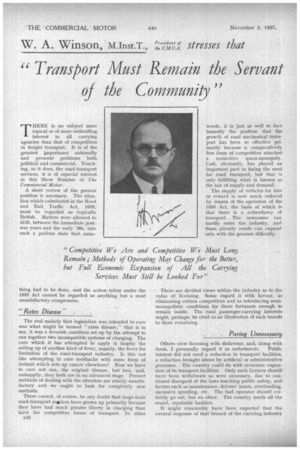"Transport Must Remain the Servant of the Community"
Page 18

If you've noticed an error in this article please click here to report it so we can fix it.
THERE is no subject more topical or of more enthralling interest to all carrying agencies than that of competition in freight transport. It is of the greatest importance nationally and presents problems both political and commercial. Touching, as it does, the road-transport services, it is of especial interest in this Show Number of The Commercial Motor.
A short review of the present position is necessary. The situation which culminated in the Road and Rail Traffic Act, 1933, must be regarded as typically British. Matters were allowed to drift, between the immediate postwar years and the early '30s, into such a parlous state that some words, it is just as well to face honestly the position that the growth of road mechanical transport has been so effective primarily because a comparatively free form of competition attacked a restrictive quasi-monopoly. Cot, obviously, has played an important part in fixing the need for road transport, but that is only fulfilling what is known as the law of supply and demand.
The supply of vehicles for hire or reward is no\V much reduced by reason of the operation of the 1933 Act, the basis of which is that there is a redundancy of transport. The newcomer can hardly enter the industry, and thcAse already inside can expand only with the greatest difficulty.


















































































